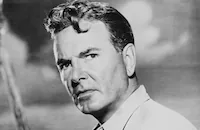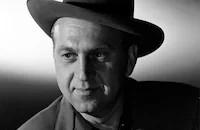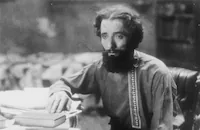Tonight We Raid Calais
Brief Synopsis
Cast & Crew
John Brahm
Annabella
John Sutton
Lee J. Cobb
Beulah Bondi
Blanche Yurka
Film Details
Technical Specs

Synopsis
English commando Geoffrey Carter is chosen to undertake a dangerous mission to a small town near Calais, where the Germans have an important munitions factory. Carter kills two German sentries during the trip, after which he hides at the farm of Monsieur and Madame Bonnard. There Carter overhears German sergeant Conrad Block pressuring the Bonnards' pretty daughter Odette to become his "housekeeper." Odette spurns his advances, but cannot afford to be unkind to him, for he knows that she illegally keeps a goat to provide milk for her orphaned nephew. The next morning, Bonnard and Odette find Carter in the barn, but because he hides near the goat, keep his presence a secret when a German patrol searches for him. Once aware that Carter is an English commando, Odette, bitter because her brother Pierre was killed in the British attack at Oran, wishes to turn him in. Bonnard insists that they help him, however, and tells him that he can impersonate Pierre, who is known to be dead by the townspeople but not by the Germans. After being instructed in Pierre's habits, Carter goes to town, where he meets with Pierre's best friend, Jacques Grandet. Jacques works in the munitions factory and tells Carter how to distinguish it from the four phony buildings erected by the Germans to fool RAF bombers. The factory is surrounded by fields owned by Bonnard, his miserly brother Maurice, the Widow Grelieu and her three daughters, and Monsieur Danton. Carter persuades the land owners to create a fire break so that he can set a fire around the factory that night, thereby creating a target for the RAF's attack. Carter is confronted by Block, but uses Block's fraternization with Odette to get him in trouble with Commandant Hauptmann. The commandant orders Block to prove his charge that Carter is the commando, which Block does by gently persuading Madame Bonnard to show him photographs of the real Pierre. The Bonnards are arrested, and despite Odette's pleas, Bonnard remains determined to make any sacrifice necessary to defeat the Nazis. Hauptmann tells Odette that he will be lenient if she locates Carter, but after she helps to have Carter, Danton and the Grelieu women arrested, he orders that her parents be executed by a firing squad. Overwhelmed by remorse, Odette questions Maurice about Carter's plans and learns about the impending raid. Meanwhile, Carter is interrogated by Hauptmann and tells him that he planted a bomb in the factory, which causes Hauptmann to send in German soldiers to investigate and evacuate the building. Soon after, Odette arrives at the jail where Carter and the others are being held and frees them after killing Block. The conspirators then race to the fields, which they burn just in time to alert the RAF. The bombing mission is successful, especially as the factory is full of German soldiers rather than French workers. Odette rushes home to her nephew and asks Carter to take him to England. Carter, who must first rendezvous with English troops in Calais, offers to take Odette also, but she insists that she must stay and fight for her country. Carter assures her that soon he and many others like him will return, and Odette replies that many more like her will be waiting.

Director

John Brahm
Cast

Annabella

John Sutton

Lee J. Cobb

Beulah Bondi
Blanche Yurka

Howard Da Silva

Marcel Dalio
Ann Codee

Nigel De Brulier
Robert Lewis
Richard Derr
Leslie Denison
Billy Edmunds
Reginald Sheffield
John Banner
Leslie Vincent
Davis Roberts
George Lynn
Carmen Beretta
Eula Morgan
Jeanine Crispin
Maria Belmar
Christiane Tourneur
Max Willenz
Major Fred Farrell
Hans Von Morhart

Charles Mcgraw
Ernst Hausman
Arno Frey
Sven-hugo Borg
Sam Waagenaar

Kurt Kreuger
Otto Reichow
Guy Kingsford
Patrick O'moore
Frederick Giermann
Louis Donath
Alfred Zeisler
Hans Wollenberger
Crew
Lucien Ballard
Harry Brand
Alfred Bruzlin
André Daven
Richard Day
William Goetz
Hal Herman
Rohama Lee
Harry M. Leonard
Robert Lewis
Thomas Little
Billy Livingston
Al Mazzola
Allen Mcneil
Cyril J. Mockridge
Emil Newman
Guy Pearce
Jerry Pyne
Waldo Salt
Walter M. Scott
Russell Spencer
L. Willinger
Roger Woog

Film Details
Technical Specs

Quotes
Trivia
Notes
The working titles of this film were Project 47, Project No. 47 and Secret Mission. The Motion Picture Herald review commented about the final title: "Why the film carries its current title is a mystery, however. There is no bombing of Calais." According to Hollywood Reporter news items, former Twentieth Century-Fox secretary Rohama Lee, who is credited onscreen with original story, was to collaborate on the screenplay with Arthur Caesar, but the extent of Caesar's contribution to the completed film has not been determined. Lee received her first onscreen credit for this film. Bryan Foy was originally set as the producer of the picture, which, according to a May 1942 Hollywood Reporter news item, was to be directed by Louis King. In September 1942, Hollywood Reporter stated that Edward Ludwig would direct the picture, and that as a result of being assigned other duties by the studio, Foy would be replaced by Andre Daven as the film's producer. Kenneth Gamet was then assigned to work on the screenplay, but the extent of his contribution to the finished film has not been determined.
According to a October 2, 1942 Hollywood Reporter news item, Henry Rowland was being considered for a leading role. Cast and crew information for the 1943 Twentieth Century-Fox picture Chetniks! is listed by mistake in the October 9, 1942 Hollywood Reporter production chart. Tonight We Raid Calais marked the screen debut of Group Theatre actor and director Robert Lewis, who also served as the picture's dialogue director. The film was the first American production worked on by Daven, and marked the return to the screen of Annabella, who had not made a picture since the 1939 M-G-M film Bridal Suite.












